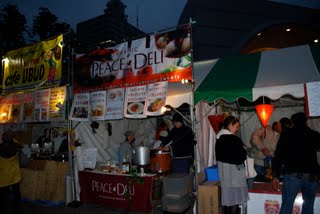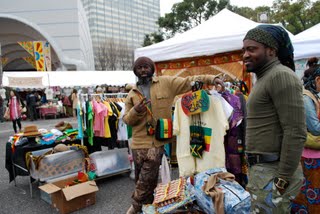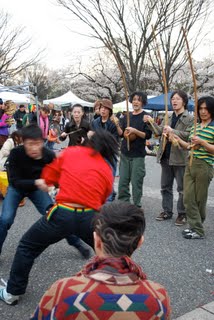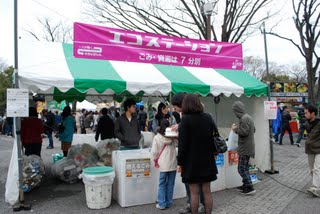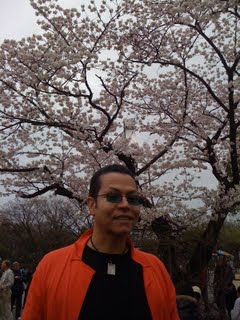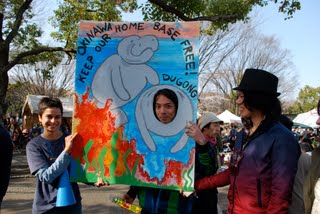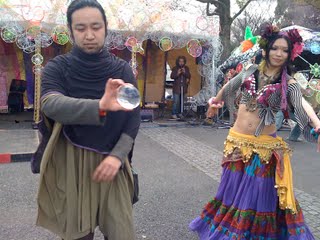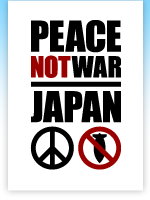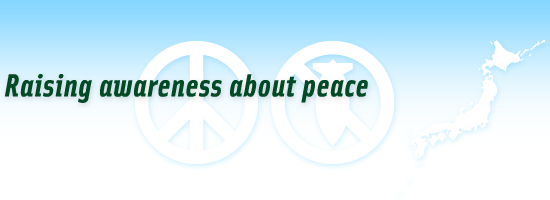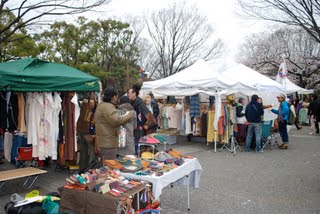 For the second year in a row during the first weekend of April, amidst cherry blossoms at their peak and near-perfect (if slightly chilly) weather, the Spring Love Harukaze festival transformed Tokyo's Yoyogi Park into a space of positive energy and peaceful vibes. The event featured some of Japan’s top musical talent, as well as a series of talk sessions related to various peace and environmental issues. In addition, the festival included a flea market with natural and eco-related goods, food stalls with organic and various world cuisines, tents with information from peace and environmental NPOs/NGOs, a DJ tent where young dancers enjoyed chilled-out grooves, and various jam sessions/performances spontaneously organized by festival-goers that seemed to crop up all over the venue throughout the weekend.
For the second year in a row during the first weekend of April, amidst cherry blossoms at their peak and near-perfect (if slightly chilly) weather, the Spring Love Harukaze festival transformed Tokyo's Yoyogi Park into a space of positive energy and peaceful vibes. The event featured some of Japan’s top musical talent, as well as a series of talk sessions related to various peace and environmental issues. In addition, the festival included a flea market with natural and eco-related goods, food stalls with organic and various world cuisines, tents with information from peace and environmental NPOs/NGOs, a DJ tent where young dancers enjoyed chilled-out grooves, and various jam sessions/performances spontaneously organized by festival-goers that seemed to crop up all over the venue throughout the weekend.
The festival was the result of a collaboration between Harukaze organizers, who put on rave parties of the same name in Yoyogi Park during the 1990s, together with the volunteer collective Peace Not War Japan, which organizes events combining music and peace. By bringing back the festival as Spring Love: Harukaze and including the educational component, the goal was to encourage festival attendees—including youth who may never before have thought about substantial social topics—to consider issues such as war, militarism, peace and sustainability.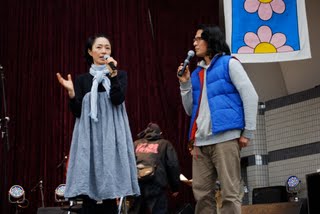 Masudo Ikue and Peace Not War Japan coordinator Fukui Hiroshi
Masudo Ikue and Peace Not War Japan coordinator Fukui Hiroshi
One speaker offering such advice for young people was Masudo Ikue, a television and film actor who is most well-known by her former stage name, Takagi Saya. While still making occasional public appearances, she decided in 2008 to largely scale back her work in order to focus on more natural pursuits such as running her own beachside eco-café/gallery, growing some of her own food, and free-diving (she is a champion record-holder in Hawaii!). “The modern capitalist system that we live in encourages us to spend our energy gathering material possessions while gradually drifting further and further away from nature and healthy ways of living, ” she told Spring Love attendees. “It is up to each one of us to look deep inside and reconnect with our own deepest selves to see what we truly want out of this life.”
Another discussion, titled “Building sustainable, non-militarized economies: examples of organic, small-scale, community-based alternatives to a military-dependent economy,” which featured three well-known peace and environmental activists, offered a similar message. “When you structure your life the way the capitalist system demands—working as a slave to one single company—your individuality has absolutely no meaning, since the instant you are gone, you will simply be replaced by another cog in the wheel,” said speaker Tanaka Yu. “The recipe for happiness is to be in control of your life by diversifying your income sources, and always doing what you want to do rather than what some boss is telling you to do.”
This sentiment was also echoed by the other two speakers on the panel. Kosaka Masaru, a thirtysomething who runs his own organic café/bar and grows his own soybeans and rice, said that his greatest happiness is putting on some great music and cooking tasty, healthy food. Writer, translator, and international activist Kikuchi Yumi, whose family lives in a restored farmhouse and grows all of their own organic vegetables and rice, also agreed—telling spectators that growing one’s own food is as easy as starting with one simple herb planter at home; anyone can do it.
She continued by describing the local currency in her region of Awa, southern Chiba, where residents are able to buy products using “Awa Money" in addition to regular Japanese yen. “This kind of local currency movement is the basis for building peaceful societies, as opposed to what happens with Japan’s major banks—where money in peoples’ savings accounts are used without their knowledge to purchase things like cluster bombs used in U.S. wars,” concluded Tanaka, who also serves as executive director of the Mirai Bank (“Bank of the Future”)—an initiative that has served as a model for other sustainable community projects such as the Artist Power Bank. “We have the power to create peaceful societies by choosing how and where we use our money.”
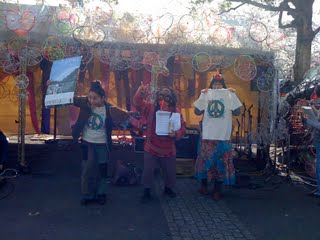 Supporters of Takae Village, Okinawa, portraying the kuina bird that is endangered by U.S. military base construction plans
Supporters of Takae Village, Okinawa, portraying the kuina bird that is endangered by U.S. military base construction plans
The third talk session also focused closely on creating alternatives to existing ills. Titled “Listen to citizens' voices: No more wasteful, destructive construction projects!”, the panel discussion featured speakers from groups working to save Mt. Takao from a highway tunnel; stop a nuclear power plant in Kaminoseki; and protect the lush Takae Village in Okinawa’s Yanbaru forest from construction of U.S. military base helipads. In the latter case, the Japanese government has brought a lawsuit against villagers who organized to stage a nonviolent sit-in protest against the construction.
“The role of a government is supposed to be protecting its citizens; but the Japanese government is clearly doing the opposite by exposing locals to these helipads, which carry very real risks of accidents using the unstable, dangerous Osprey helicopters,” said Peace Not War Japan coordinator Fukui Hiroshi. He organized the panel with the intent of helping create solidarity among these various domestic movements, who all face the common issue of attempting to protect human beings and nature alike from militarism’s seemingly endless capacity for destruction.
The event’s final talk session, titled “Why should Japan's Constitutional Article 9 (the peace clause) be protected?”, also considered the ways in which governments should function, as opposed to how they often do so in reality. “With Japan’s peace constitution in danger, we must also look at other examples of peace constitutions at work, such as the case of Ecuador, which successfully ousted a U.S. military base,” said panel moderator and Peace Boat staff member Matsumura Masumi.
“Japan must protect its peace constitution in order to avoid becoming a country like the United States, where systematic poverty results in young people being shipped off to fight destructive wars,” agreed freelance journalist Shiva Rei, who has seen firsthand the violence of war and occupation areas like Iraq and Gaza. “We must also do what we can to solve other related problems, such as making sure that we use natural energy sources rather than nuclear power—something that requires that we act on both personal and social/political levels.”
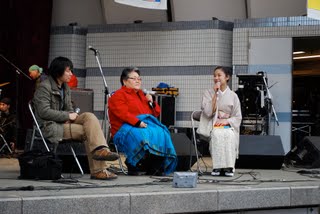 Panelists Shiva Rei, Kamebuchi Yuka and Matsumura Masumi discussing issues related to Japan's Constitutional Article 9
Panelists Shiva Rei, Kamebuchi Yuka and Matsumura Masumi discussing issues related to Japan's Constitutional Article 9
"This kind of topic might not come naturally for some of us,” concluded the third panelist Kamebuchi Yuka, a gospel singer and director of the Harukaze planning committee.“But one thing that every single one of us here can do is to go home tonight and talk to others about what we heard here at this festival. Another thing we can do is to get educated about the constitutional change election that is coming up next month.”
The event featured two stages: the main Spring Stage, where most musical acts and peace talks took place; and the smaller, cozier Love Stage, which housed DJs, smaller musical acts, and presentations from representatives of several of the NPOs and NGOs in attendance. One such group was US for Okinawa, made up mostly of foreign residents in Japan who are committed to demonstrating their support for a base-free Okinawa. In addition to introducing themselves on the Love Stage, the group organized a booth at the event with a photo exhibition, FAQ sheetFlier-Why%20Bases%20Don%27t%20Protect%20Japan.Jp.pdf, and petition all aimed at making clear the destructive impact of U.S. military bases. Coincidentally, many of the network's core members were actually on a study tour to visit U.S. bases in Okinawa on the very same weekend as Spring Love—their report of their very fruitful tour may be read here. 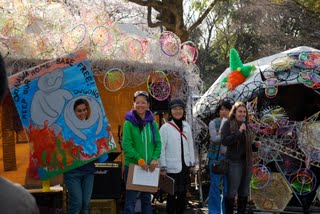
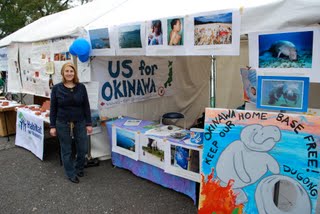
Another speaker on the Love Stage was Clara Shinobu Iura, a Japanese-Brazilian who is one of the 13 indigenous grandmothers featured in the film “For the Next Seven Generations”, which recounts how the women came together from around the world in an attempt to impart their knowledge and healing wisdom to younger generations before it is too late. “I was warned by my sister to be careful when visiting Mt. Fuji, because I am such a sensitive person and might be susceptible to particular energies there,” Iura told festival listeners. “Well, that is exactly what happened…it was as if the mountain was speaking to me, and telling me to dedicate my life to trying to save the earth.” Iura, who is now a practicing shaman in the Amazon rainforest of Brazil, will visit Amami Oshima island in southern Japan with the other grandmothers this coming October for a festival event, where they will conduct healing prayers and workshops. More information is available about the grandmothers’ project here. 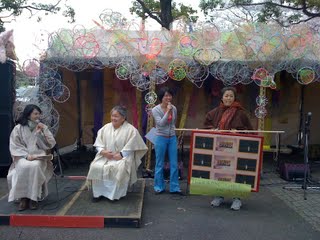 Clara Shinobu Iura, seated right
Clara Shinobu Iura, seated right
Many other organizations were also in attendance, including From Earth, an ecology/fair trade shop promoting organic lifestyles; and the nonprofit groups Habitat for Humanity and Natural House, which partnered to spearhead a unique fundraiser for survivors of the earthquake in Haiti by selling handmade bricks for ¥500 in a project simulating the construction of new homes.
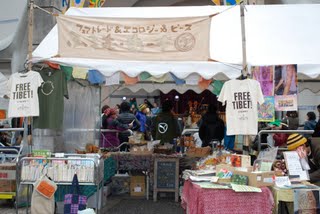
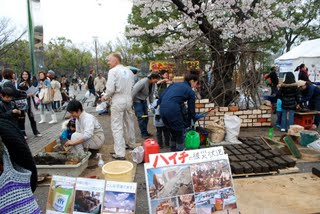 Many of the performing artists also took the opportunity while onstage to share messages supporting the overall spirit of the event. “Even if we feel we cannot make a difference on a large scale with our individual actions, it is still important to live every single moment with purpose and clarity; this in itself is a step toward creating a peaceful world,” said the spokesperson for Gocoo, a phenomenal 11-piece wadaiko (Japanese drum) ensemble.
Many of the performing artists also took the opportunity while onstage to share messages supporting the overall spirit of the event. “Even if we feel we cannot make a difference on a large scale with our individual actions, it is still important to live every single moment with purpose and clarity; this in itself is a step toward creating a peaceful world,” said the spokesperson for Gocoo, a phenomenal 11-piece wadaiko (Japanese drum) ensemble.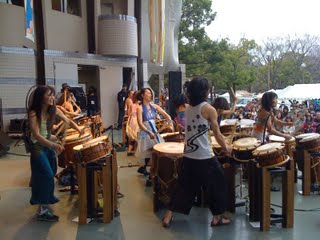 The event’s closing artist, Sandii Bunbun, offered what was perhaps one of the most striking stage performances of the entire weekend. An internationally-known rock singer who collaborated with many famous artists during the 1970's and 80's using various stage names, Sandii—who grew up in Hawai’i—returned to her roots some years ago by performing more Hawai’ian music, and also earning the rank of Kumu Hula (hula master).
The event’s closing artist, Sandii Bunbun, offered what was perhaps one of the most striking stage performances of the entire weekend. An internationally-known rock singer who collaborated with many famous artists during the 1970's and 80's using various stage names, Sandii—who grew up in Hawai’i—returned to her roots some years ago by performing more Hawai’ian music, and also earning the rank of Kumu Hula (hula master).
After first mindfully purifying the energy of the space, Sandii began her set by singing and drumming several numbers dedicated to Pele, the Hawai’ian goddess of passion and fire, while flanked by a troupe of her dancing students, known as the Hula All Stars. This was followed by an energetic set with her band, Earth Consciousness, which featured instrumentation including a didgeridoo, as well as stunning background visuals projected behind the stage. 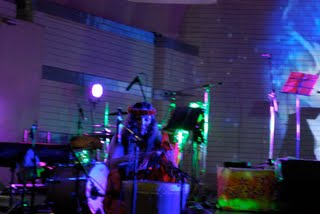
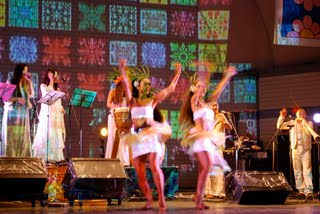 Just prior to her performance, Peace Not War Japan shared a powerfully poignant message of solidarity that had been received from activist Kyle Kajihiro in Hawai’i, which may be read in full here.
Just prior to her performance, Peace Not War Japan shared a powerfully poignant message of solidarity that had been received from activist Kyle Kajihiro in Hawai’i, which may be read in full here.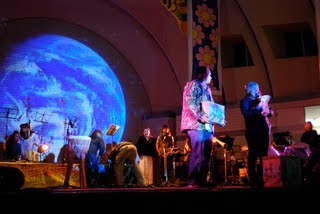 Peace Not War Japan coordinators Fukui Hiroshi and Kimberly Hughes
Peace Not War Japan coordinators Fukui Hiroshi and Kimberly Hughes
Thoughtful solidarity message were also received from Sung-Hee Choi, an activist with the No Base Stories of Korea website; and Peace Not War Japan founder Dom Pates.
"I enjoyed myself here so much," said one event-goer, a third-year university student of social issues and history. "Coming here made me feel like it is possible to change the world to make it a better place!"
Peace Not War Japan extends deepest thanks to all artists and participants who helped make the Spring Love Harukaze event possible, as well as the 40,000 some attendees who dropped by the event over the weekend to make it their own—and everyone who took the time to read this report.
Truly…each one of us represents the peace we wish to see in the world!
